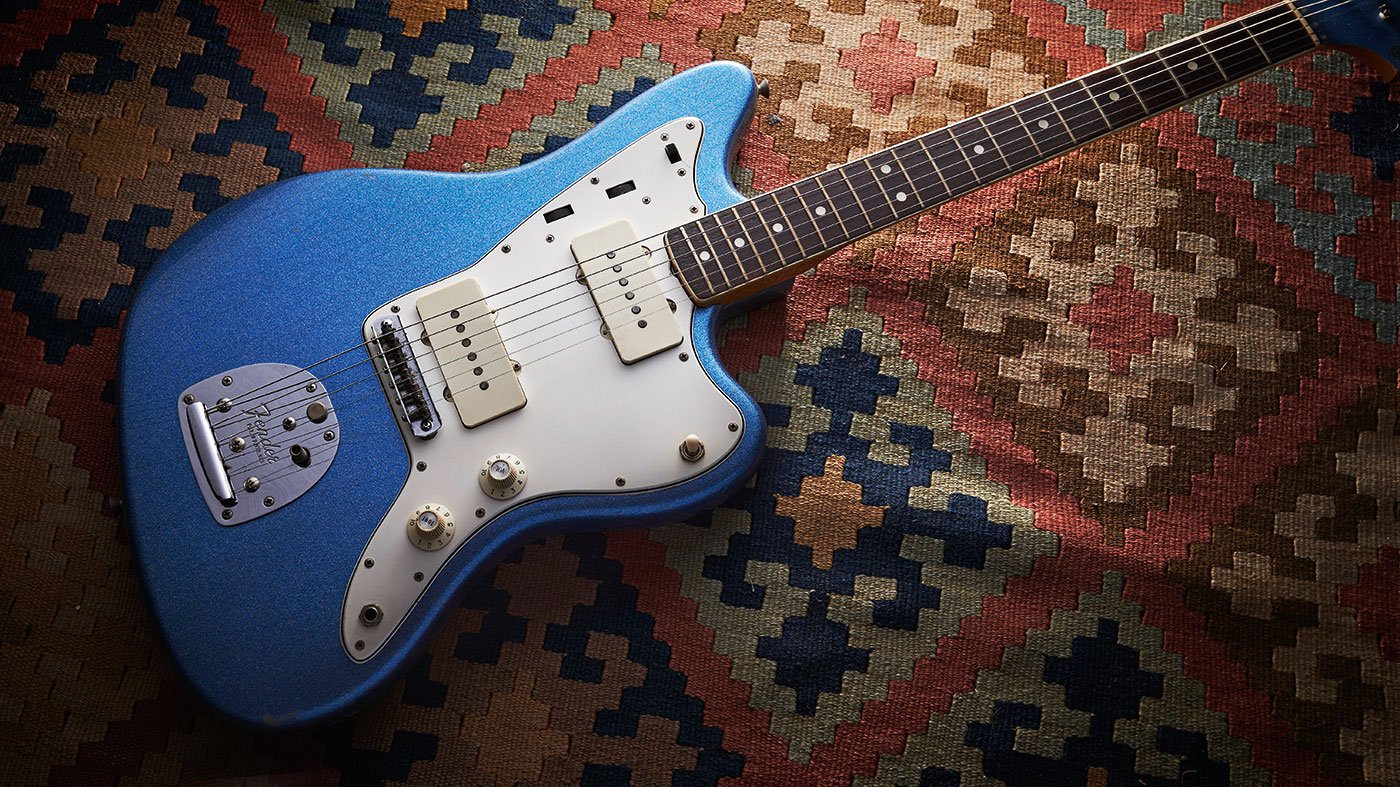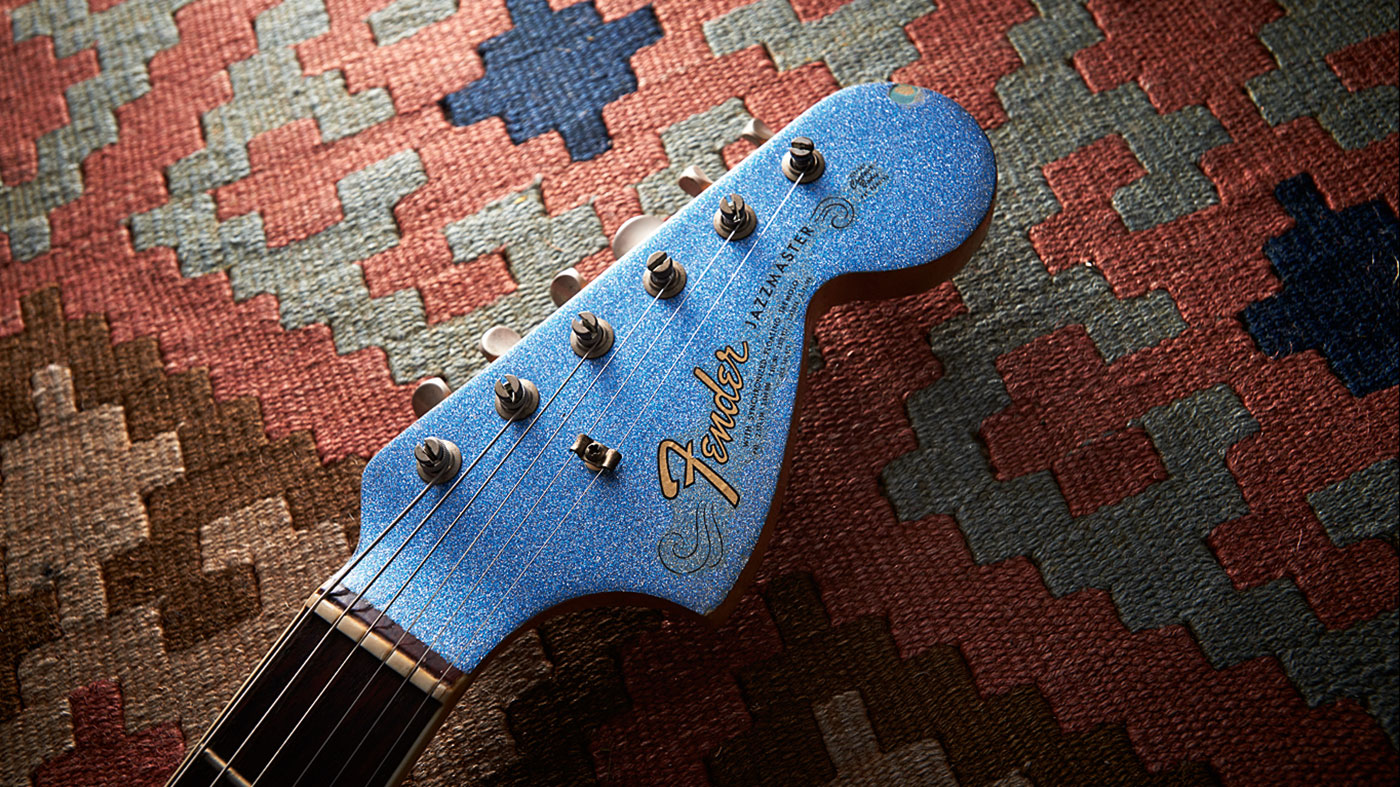
Another iconic instrument celebrating its 60th birthday this year is Fender’s Jazzmaster. Launched in 1958 as a successor to the Telecaster and Stratocaster, one of the new offset Fender’s missions was to tempt the jazz players of the day away from their beloved archtops and onto a more fashionable solidbody instrument.
But the jazzers remained faithful to their big-bodied six-strings and the Jazzmaster went on to find unexpected fame with the brand new surf music genre of the day.
A 1966 Jazzmaster in this kind of condition is unusual enough, but the comparatively rare Blue Sparkle Custom Colour adds to the rarity
Latterly the Jazzmaster enjoyed a resurgence during the new wave era of the mid-70s and more recently the with indie crowd. In fact, it seems to have found its way into every form of popular music except jazz, with players as diverse as The Ventures, Elvis Costello, Nils Lofgren and Thom Yorke being seen in its company.
The Jazzmaster enjoyed a lengthy run in the Fender catalogue, from 1958 until it was discontinued in 1980. However, it didn’t take long for Fender Japan to restore it in the mid-1980s and it has survived in various forms since, including signature models like the J Mascis edition. The most recent manifestation is the 2017 limited edition pine-bodied American Professional model.
As far as the vintage edition we have before us here, a 1966 Jazzmaster in this kind of condition is unusual enough, but the comparatively rare Blue Sparkle Custom Colour adds to the rarity of this instrument quite significantly. Even after all these years, it still hasn’t found a space amongst the jazz players it was intended for, but for many the charms of the Jazzmaster cannot be outdone.
Body
The offset body - which, like its Stratocaster stablemate, was either alder or ash - was designed so that it was comfortable and balanced when played sitting down. Obviously another attempt to lure the notoriously sedentary jazz players of the day!
Headstock
Matching the peghead with the body paintwork on Jazzmaster, Jaguar and Jazz basses began around 1962, Fender considering these models to be ‘top of the range’. Note the ‘transition’ Fender logo.
Want all the hottest music and gear news, reviews, deals, features and more, direct to your inbox? Sign up here.
Pickguard
On regular Sunburst, white or black Jazzmasters, the pickguard would be tortoiseshell, but on Custom Colour models Fender used white.
Controls 1
The infamous onboard Rhythm/Lead circuitry was controlled by a toggle switch and two thumbwheels for volume and tone. When the rhythm circuit was engaged, it deactivated the bridge pickup, the lower volume/tone rotaries and three-way toggle in order to offer greater control over your rhythm sound.
Controls 2
The Jazzmaster’s controls are perplexing to many, but the lower bout held few surprises: simple master volume and tone controls with a three-way selector switch was all you had to deal with on this side of the guitar!
Trem
The Jazzmaster’s tremolo system was seen as an improvement on the Stratocaster’s, although many would argue to the contrary. Acting with a rocking bridge which is meant to return to a zero point when the trem arm is released, the system was unreliable and caused all manner of tuning problems in use. Luckily, you could deactivate it via the raised knob…
Neck
Essentially identical to the Stratocaster’s neck in nearly all respects, this model sports a bound fingerboard introduced by Fender in late ‘65.
We would like to thank Vintage ‘n’ Rare Guitars, Bath for giving us access to this fascinating instrument.
Guitarist is the longest established UK guitar magazine, offering gear reviews, artist interviews, techniques lessons and loads more, in print, on tablet and on smartphones
Digital: http://bit.ly/GuitaristiOS
If you love guitars, you'll love Guitarist. Find us in print, on Newsstand for iPad, iPhone and other digital readers



